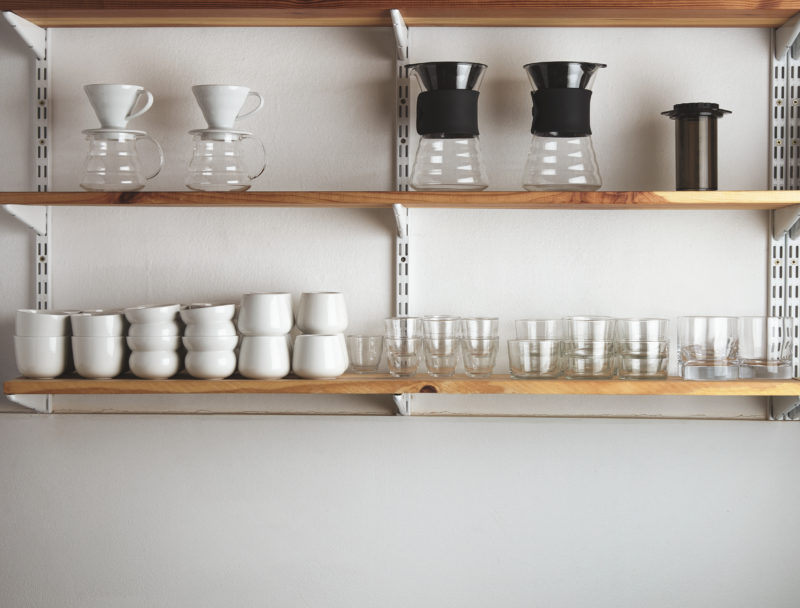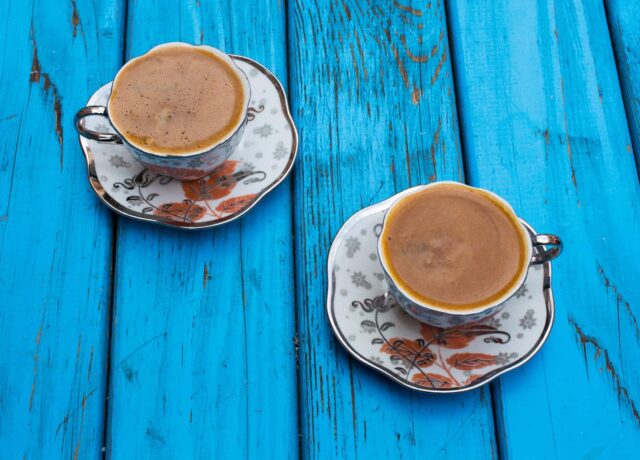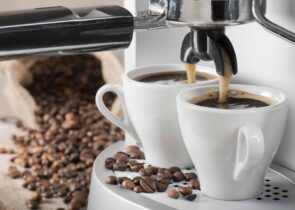With the rise of low-waste lifestyles and increasing consumer awareness, it’s no surprise people are starting to take a hard look at what exactly is brewing their morning cup of coffee. While almost every coffee maker is made using some plastics, not all plastics are created equal. Read on for our top picks for the best BPA free coffee maker!
If you’re just looking for a new coffee maker, check out our guide to the best drip brewers here!

What is BPA?
BPA stands for Bisphenol A, a chemical used to harden plastics. It is integral to the creation of polycarbonate plastics and epoxy resins, which are used in numerous consumer goods. Some of the most common places to find BPA are in food/beverage storage containers and coating inside metal products (like food cans, bottle tops, etc.). It’s also commonly utilized outside of food-related goods.
The concern cropping up around BPA food products particularly is a result of very small amounts of the chemical leaking into food and being consumed. This amount significantly increases when the item is heated, which is why most baby bottles no longer contain BPA.
While the FDA maintains that the amount of BPA that can seep into your food or drink is far too low to cause any damage, with side effects like infertility, birth defects, and other hormone-related complications, many people are actively seeking to reduce their exposure.
BPA in Coffee Makers
So what does all that have to do with the thing brewing your morning cup of coffee? Let’s talk about it.
Because BPA seepage is amplified by heat, it is undesirable to have BPA plastics come in contact with your coffee while it is brewing. Having recognized this, many coffee maker manufacturers have taken steps to alter their product designs to ensure that they are BPA free.
Not all plastic coffee makers are toxic! While some coffee makers labeled as BPA free still have BPA plastics, the label indicates that those plastics do not come in contact with the brew. So a brewer can have plastics and still be safe to use.
That said, many coffee makers are 100% BPA free. These alternative coffee makers are made using materials such as stainless steel, glass, other metals, and porcelain.
How to know if your Coffee Maker is BPA Free
The main parts of the coffee maker you’ll need to look at are the water reservoir, filter basket, and carafe. These are the components that your coffee comes in direct contact with. If all of these are non-plastic, chances are you’re in the clear.
It may be harder to tell with the carafe and reservoir, as clear, ultra-durable polycarbonate plastic can often look like glass or other materials at first glance. If you are unsure, take a look at the labeling on the bottom of the component in question.
If you find the number 7 or letters PC engraved or embossed on it, then it is indeed plastic and the chances are that it does contain BPA. However, the most surefire way to double-check is to go ahead and take a look at the user manual.
Best BPA-Free Coffee Makers
Automatic Brewers
Keep in mind, all automatic brewers have some plastic, otherwise, they would be obscenely expensive and likely would not work quite as well or last as long. However, every brewer we’re going to talk about here uses BPA free plastics, so you won’t need to worry about any negative side effects.
Technivorm Moccamaster 8-cup Coffee Maker (59616 KBG)
First up, we have the Technivorm 8-cup coffee maker. This 40 oz brewer can whip up your brew in 4-6 minutes using specially designed copper elements, rather than the standard pumps. After 100 minutes, the auto-shutoff will kick in to help conserve energy.
Also, this Tehcnivorm machine is handmade in the Netherlands using high-quality, recyclable materials. Both the brewing system and hot plate are specifically designed to keep your coffee at the perfect temperature without negatively impacting the flavor.
Not only are all of the components 100% BPA free, but this coffee maker is also BPS, BPF, and Phthalate-free. Plus, it is backed by a 5-year Manufacturers warranty, so you can brew easy with complete peace of mind.
Presto 02811 12-Cup Stainless Steel Coffee Maker
Next, we have one of the most popular BPA-free coffee makers on the market: the Presto automatic percolator. You can brew anywhere from 4 to 12 cups at a time with this stainless steel coffee maker. It features an easy pour spout and a convenient ready-to-serve signal light.
As we mentioned, this is essentially an automatic percolator, so you won’t have to worry about closely monitoring your brew as you would with a standard, stovetop percolator. Instead, you just sit and wait. Once, the light comes on, you are ready to go.
Every component of this machine is stainless steel (including the filter basket and perk tube), save for the plastic handle intended to prevent heat transfer to your hand. However, because the handle does not come in contact with your coffee, there’s no need to worry.
Bonavita 8-Cup Original Coffee Maker (BV1800SS)
If you prefer something with a bit more of a classic feel, then the Bonavita Original 8-cup might suit you. This coffee maker features a one-touch brew operation and a specialized wide showerhead to fully saturate and extract your coffee.
The filter basket is also V-shaped to help ensure that the coffee is evenly and thoroughly saturated, so you won’t waste a granule of coffee. Additionally, the Bonavita brewer is made with a durable, stainless-steel lined thermal carafe.
The carafe lid, filter basket, and showerhead are dishwasher safe and all plastic is BPA-free. Despite the higher price point, we think that this coffee maker earns the steeper price tag, as it is certainly worth investing in if you have a more flexible budget.
Breville Grind Control Coffee Maker (BDC650BSS)
If you’re a fan of coffee, chances are you’ve heard of Breville. This brewer has everything you could want: 8 strength settings, built-in bean grinder, variable brew volume options (1-12 cups), auto-start, pre-brew temperature control, and more.
The BDC650BSS Grind Control is constructed primarily of stainless steel but does feature some BPA Free plastic components, such as the carafe lid, the coffee basket assembly, and water reservoir.
Like the Bonavita model, this Breville coffee maker has a thermal carafe to keep your coffee hot without re-adding heat to it. With all the additional upgrades, it’s pretty hard to resist splurging on this machine.
Mr. Coffee 12-Cup Coffee Maker
Last, in our line-up of automatic BPA-free coffee makers, we have the Mr. Coffee 12-Cup Coffee Maker. Mr. Coffee is known for producing straightforward, easy to use coffee makers with a classic feel and this one is no exception. It features an on/off indicator light, brew-pause function, dual water windows, removable filter basket, and auto-shutoff (after 2 hours).
While not all Mr. Coffee makers are BPA free, the plastics used in this one that come in contact with your brew are BPA free. So you can sip safely.
Manual Brewers
Honestly, your best bet, if you want no plastic of any kind to come in contact with your brew, is to go for a manual brewer. Most of these products, except for the AeroPress, have little to no plastic. And if they do have plastic at all, every bit of it is BPA free.
Hario Ceramic Pour Over Coffee Maker
One of the most sure-fire ways to get a completely plastic-free coffee maker is to look into pour-overs. This one for Hario is one of our favorites. It has a durable, ceramic body that is cone-shaped with spiral ribs to allow for great, full coffee extraction.
The Hario Pour Over is designed and manufactured in Japan. As we mentioned before, this one is made entirely of ceramic (though it is available in metal and glass versions as well), so you won’t need to worry about any pesky plastics.
As a bonus, this coffee maker is available in several different colors, and depending on the size you choose, it is versatile enough to brew anywhere from one cup of coffee to four, making it perfect for one or two coffee fanatics.
Chemex Pour-Over Coffee Maker
Another popular pour-over option is the Chemex 8-cup coffee maker. This is a great option for those who are interested in this type of coffee maker but would prefer a little more versatility than a standard pour-over affords. Some people even use it for cold brewing!
The body of the Chemex is made of non-porous Borosilicate glass accompanied by a wood handle and leather detail. So, again, no plastic in sight. Other Chemex coffee makers are completely glass and come in different sizes, so you’ll be able to find something that works for you in their line-up.
As an added plus, Chemex filters are some of the only ones that are completely Made in the USA, so you can check that box on your conscious consumerism sheet.
SterlingPro French Press Coffee Maker
Pour-over coffee not your cup of tea? Try a French Press coffee instead! The SterlingPro is one of our top 10 picks for the best french press on the market. This has a modern, stainless steel design with double-walled construction (to keep your coffee hot) and a dual filter screen (to keep your coffee grit-free).
This coffee maker is available in 1 L, 1.5 L, and 1.75 L models. Each one is made with surgical-grade stainless steel and absolutely nothing else. No plastic handles, tops, strainers, etc. to worry about. You can count on this coffee maker to be durable and long-lasting.
Thanks to the stainless steel construction, this coffee maker is fully dishwasher safe, so it is incredibly easy to clean and use. You won’t have to worry about any pesky plastic parts.
Aerobie Aeropress
Aeropress is a great example of how #notallplastics are dangerous. While the Aeropress is still technically a plastic coffee maker, it is completely BPA free. They use Polypropelene, a non-toxic, recyclable, and heat resistant commodity plastic, to make their coffee makers. We love this brewer because you get the impressive durability of hard plastic products in combination with longevity and safety.
You can usually find this coffee maker either as a stand-alone product or with several accessories, from free filters to a travel bag. Aeropress coffee makers can brew either American-style coffee or espresso-like brews, to suit whatever your coffee needs are.
Plus, the Aeropress is just an all-around cool product! It’s the perfect combination of rugged outdoorsy tool and sleek, user-friendliness. Wherever you take these things, they’re going to be great for you.
Benefits of Banishing BPA
As mentioned above, the chances of experiencing any of the negative side effects of BPA seepage. However, the nature of traditional coffee brewing (ie. the involvement of heat) does likely marginally increase what little risk there may be. Thus, for those of us with a paranoia streak can rest easier with a BPA free coffee maker.
Aside from the potential safety factor, the biggest benefit of going BPA-free is durability. BPA plastics tend to be less durable over time than their alternatives.
While a porcelain pour-over might last you a half a lifetime (assuming you don’t drop it), but a coffee maker that relies heavily on these plastics might wear out in just a few short years (or even months if you are unlucky).
Things to Consider
Before you move forward with purchasing your shiny new BPA free coffee maker, we’re going to cover a few bases. There are plenty of different factors that go into a coffee maker that can affect your daily brew. While this article focuses primarily on whether brewers have BPA free plastics or are plastic-free, there are several other factors you should take into consideration before making a purchase.
Brewing
Regardless of whether you’re on the hunt for a BPA free coffee maker or any other niche brewer, the main thing that matters is, of course, the coffee. And the three most important parts of brewing are time, volume, and method.
First and foremost, the time it takes for a coffee maker to complete its brew is important when considering how that brewer will fit into your lifestyle. If you need your coffee pre-prepared when you wake up, take a look at the programmable coffee makers. If not, you can probably save a few bucks on a more basic brewer.
Alternatively, if you have a little more time to spend with your brew, consider going for one of the manual coffee makers to whip up your morning cup of coffee. On a similar note, it’s pretty apparent that the method plays a role in determining whether a coffee maker is appropriate for your lifestyle.
The other factor to consider is how much coffee a particular coffee maker can brew at a time. The coffee makers on our list range anywhere from 1 to 14 cups (between 5 and 70 ounces).
Build
While all of these brewers are BPA free, there is still a TON of variation in what the alternative build material is. The automatic brewers typically use a combination of hardened plastics and stainless steel. However, among the manual brewers, there is a bit more variety.
Some of the best options are glass and ceramic as they are often completely plastic-free, though several great options are stainless steel or 100% BPA free plastic.
In terms of build, you will also need to consider the filter. If you are interested in going low-waste, then you’ll want something like a french press with the coffee filter built-in. Anything else will require that you use paper filters or invest in a permanent one.
Also, so make sure to measure your space if you are going for one of the automatic coffee makers, that way you can make sure the footprint of your machine is suitable for your needs.
Convenience
Lastly, you need to know whether your coffee maker of choice is going to work logistically with your lifestyle. While having a fancy-schmancy ceramic pour-over might sound nice in theory, if you don’t have the time to perfect your technique, the coffee isn’t going to be worth it.
On the other hand, if you do have a little extra time in the morning and would prefer to have something easy to clean and maintain (ie. something that doesn’t require descaling) a manual brewer like a french press, AeroPress, or pour-over might be a great choice for you.
Automatic brewers are better for people who are on the go day-to-day but still have the time to maintain their machines on the weekends.
Wrapping Up
So there you have it! While it can often be difficult to find BPA-free coffee makers, it is certainly not impossible. Whether you’re a french press coffee person or a souped-up automatic brewer type of person, we are confident that there is a BPA-free coffee maker here to make your morning cup of coffee a little more plastic-free.
Whether you are making the switch for health concerns or simply in hopes of finding a more long-lasting coffee companion, brewing your coffee BPA-free is a great choice. As with anything, remember to keep an eye on research as it comes out, to determine just how plastic-free you want your coffee to be.
While BPA-free coffee is a good way to go according to current evidence, there is always a chance that you will later be advised to go completely plastic-free or that other plastics have similar properties to BPA and may also need to be avoided, in which case one of our manual brewers could be the way to go.
Stay informed, and as always…
Happy Caffeinating!
















